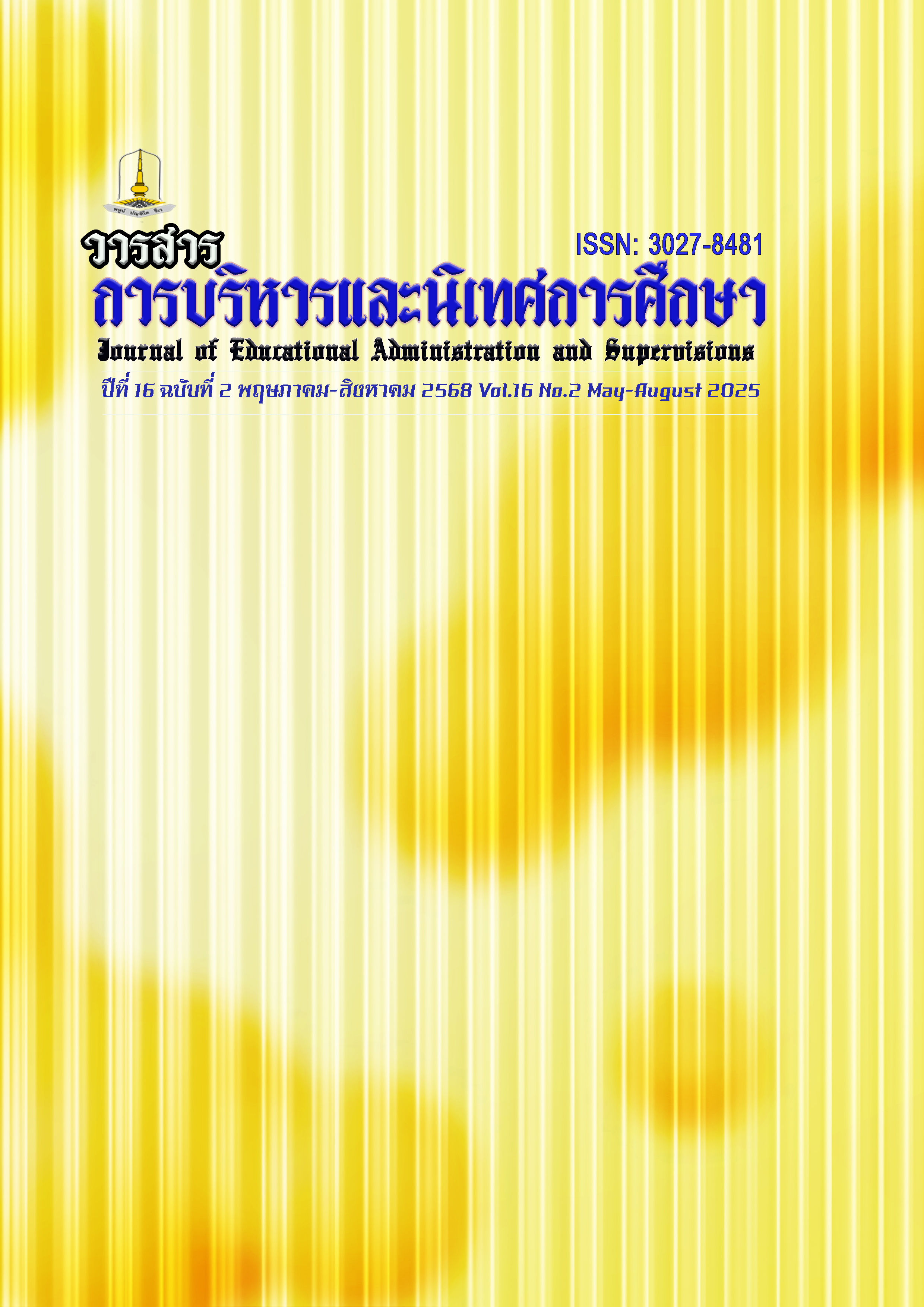Guidelines for Digital Leadership Development of School Administrators under the Office of Mahasarakham Secondary Educational Service Area
Main Article Content
Abstract
The purposes of this research were: 1) to explore existing situation, desirable situation, and the priority needs to develop digital leadership of school administrators; and 2) to investigate the guidelines to develop digital leadership of school administrators. The mixed methods research was employed. The 1st phase was exploring the existing situation, desirable situation, and the priority needs to develop digital leadership of school administrators. The samples were 317 school administrators and teachers in Secondary schools. The samples were randomized through stratified random sampling technique, classified by school sizes. The research instrument was a 5-rating scale questionnaire. The 2nd phase was investigating the guidelines to develop digital leadership of school administrators. The informants were 5 school administrators being the best in digital leadership, and 5 experts evaluated the guidelines. The research instruments were a semi-structured interview form, and an evaluation form of the guidelines. Statistics used were mean, and standard deviation.
The research results were: 1) The existing situation to the digital leadership of school administrators was at a medium level, while the desirable situation was at a high level. The priority needs ranked from high to low were: digital vision, digital ethics, technological competencies, and digital ways of learning, respectively; and 2) The guidelines to develop digital leadership of school administrators were: 2.1) digital vision aspect: school administrator should emphasize on long-term perspective in utilizing digital technology and setting administrative system efficiently; 2.2) technological competency aspect: school administrators should develop the abilities to use technology for school administration, develop teachers on digital technology skills, develop network to utilize digital technology; 2.3) digital ways of learning aspect: school administrators create the digital organization culture, promote teachers to develop their digital skills; 2.4) digital ethics aspect: school administrators attend seminar on utilizing digital technology with ethic, responsibility and creativity. The assessment of the guidelines was at the highest level of propriety, feasibility and utility.
Downloads
Article Details

This work is licensed under a Creative Commons Attribution-NonCommercial-NoDerivatives 4.0 International License.
References
กระทรวงศึกษาธิการ. (2564). แผนปฏิบัติการดิจิทัลเพื่อการศึกษา กระทรวงศึกษาธิการ 2563-2565. สำนักงานปลัดกระทรวงศึกษาธิการ.
จันทนา แสนสุข. (2559). ภาวะผู้นำ: Leadership (พิมพ์ครั้งที่ 3). บริษัททริปเพิ้ลกรุ๊ปจํากัด.
จิณณวัตร ปะโคทัง. (2561). ภาวะผู้นำยุคดิจิทัลสำหรับผู้บริหารสถานศึกษามืออาชีพ. มหาวิทยาลัยราชภัฏอุบลราชธานี.
จิราภรณ์ ปกรณ์. (2564). รูปแบบภาวะผู้นำดิจิทัลของผู้บริหารสถานศึกษา สังกัดสำนักงาน
คณะกรรมการการศึกษาขั้นพื้นฐาน. [วิทยานิพนธ์ปริญญาดุษฎีบัณฑิต, มหาวิทยาลัยศรีนครินทรวิ โรฒ]. http://ir-ithesis.swu.ac.th/dspace/bitstream/123456789/1915/1/gs621120032.pdf
ดาวรุวรรณ ถวิลการ. (2564). ภาวะผู้นำดิจิทัล. มหาวิทยาลัยขอนแก่น.
ดาวรุวรรณ ถวิลการ. (2562). ศาสตร์และศิลป์ทางการบริหารการศึกษา. โรงพิมพ์มหาวิทยาลัยขอนแก่น.
นิกร จันภิมล และศตพล กัลยา. (2562). เทคโนโลยีการศึกษาในยุค Thailand 4.0. วารสารปัญญาภิวัฒน์. 11(1): 304-314. https://so05.tci-thaijo.org/index.php/pimjournal/article/view/186303
บุญชม ศรีสะอาด. (2560). การวิจัยเบื้องต้น ฉบับปรับปรุง (พิมพ์ครั้งที่ 10). สุวีริยาสาส์น.
บุษยพรรณ สุระคาย. (2565). การพัฒนาโปรแกรมเสริมสร้างภาวะผู้นำดิจิทัลของผู้บริหารสถานศึกษา สังกัดสำนักงานเขตพื้นที่การศึกษามัธยมศึกษาบุรีรัมย์. [วิทยานิพนธ์ปริญญามหาบัณฑิต, มหาวิทยาลัยมหาสารคาม]. https://so06.tci-thaijo.org/index.php/jslc/article/view/268176
พิชญาพงศ์ พันธ์จันทร์. (2563). ภาวะผู้นำดิจิทัลของผู้บริหารสถานศึกษา ตามทัศนะของข้าราชการครู สังกัดสำนักงานเขตพื้นที่การศึกษามัธยมศึกษา เขต 28. [วิทยานิพนธ์ปริญญามหาบัณฑิต, มหาวิทยาลัยราชภัฏอุบลราชธานี]. https://so04.tci-thaijo.org/index.php/JMHR/article/view/a-34
พิชญ์พิมล สุนทะวงศ์. (2565). แนวทางการพัฒนาภาวะผู้นำเชิงดิจิทัลของครูสังกัดสำนักงานเขตพื้นที่การศึกษามัธยมศึกษามหาสารคาม. [วิทยานิพนธ์ปริญญามหาบัณฑิต, มหาวิทยาลัยมหาสารคาม]. https://so04.tci-thaijo.org/index.php/neuarj/article/view/263393
ภิรมณ ซึมกระโทก. (2565). การพัฒนาโปรแกรมเสริมสร้างภาวะผู้นำดิจิทัลของผู้บริหารสถานศึกษา สังกัดสำนักงานเขตพื้นที่การศึกษาประถมศึกษามหาสารคาม เขต 1. [วิทยานิพนธ์ปริญญามหาบัณฑิต, มหาวิทยาลัยมหาสารคาม]. http://202.28.34.124/dspace/handle123456789/1755
ไวยวิทย์ มูลทรัพย์. (2565). การพัฒนาโปรแกรมเสริมสร้างภาวะผู้นำดิจิทัลของผู้บริหารสถานศึกษา สังกัดสำนักงานเขตพื้นที่การศึกษามัธยมศึกษากาฬสินธุ์. [วิทยานิพนธ์ปริญญามหาบัณฑิต, มหาวิทยาลัยมหาสารคาม]. http://202.28.34.124/dspace/bitstream/123456789/1739/1/62010586053
สุกัญญา แช่มช้อย. (2561). การบริหารสถานศึกษาในยุคดิจิทัล. สำนักพิมพ์จุฬาลงกรณ์มหาวิทยาลัย.
สุชญา โกมลวานิช. (2563). ภาวะผู้นำดิจิทัลของผู้บริหารสถานศึกษาที่ส่งผลต่อสมรรถนะครูในศตวรรษที่ 21.สังกัดสำนักงานเขตพื้นที่การศึกษามัธยมศึกษา เขต 23. [วิทยานิพนธ์ปริญญามหาบัณฑิต ไม่ได้ตีพิมพ์]. มหาวิทยาลัยขอนแก่น.
สุวิมล ว่องวาณิช. (2558). การวิจัยประเมินความต้องการจำเป็น. สำนักพิมพ์จุฬาลงกรณ์มหาวิทยาลัย.
สำนักงานคณะกรรมการศึกษาขั้นพื้นฐาน. (2566). นโยบายและจุดเน้นของสำนักงานการศึกษาขั้นพื้นฐาน 2567. https://www.moe.go.th/360policy-and-focus-moe-fiscal-year-2024.
Chandrasekar, A., and Mallis, E. (2021). Digital leadership readiness: Lessons from Singapore. Greensboro, NC: Center for Creative Leadership.
Hanna, R. & Kazim, E. (2021). Philosophical foundations for digital ethics and AI ethics: A dignitarian approach. AI Ethics, 1(1): 405-423. https://doi.org/10.1007/s43681021-00040-9.
Hensellek, S. (2021). Digital leadership: A six-step framework for transformation. Journal of Media Management and Entrepreneurship, 1(2): 55-69. https://doi.org/10.4018/JMME.2020010104.
Krejcie, R. V. & Morgan, D. W. (1970). Determining sample size for research activities. Educational and Psychological Measurement. 30(3): 607-610. https: //doi.org/10.1177/001316447003000308
Sheninger, E. C. (2016). Digital leadership: changing paradigms for changing times. CA: Sage Publications.
Sullivan, L. (2017, June 21). 8 Skills Every Digital Leader Needs. https://www.cmswire.com/digital-workplace/8-skills-every-digital-leader-needs
Tran, L. (2017, August 08). Digital transformation: The 5 must-have skills for digital leaders. https://www.inloox.com/company/blog/articles/digital-transformation-the-5-must-have-skills-for-digital-l


